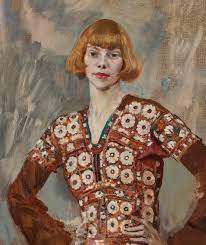While researching someone else, I stumbled upon some of Iris Tree's WW1 poems and realised that, although she has an Exhibiton Panel, she was not on the weblog so I decided to put that right
 |
| Iris's portrait byAugustus John |
Iris’s Father ran The Herbert Beerbohm Tree Company of performers, of which Basil Hallam ("Gilbert the Filbert" – see below) was a member. Beerbohm Tree also managed The Haymarket Theatre and His Majesty’s Theatre in London, presenting Shakespeare’s work, classic plays, new works and adaptations of novels. In 1904, Beerbohm founded The Royal Academy of Dramatic Art and in 1909 he was knighted for his services to the theatre,
Iris was a poet, actress and artist’s model. She was described as ‘an eccentric, a wit and an adventuress’. One of her friends - another WW1 poet Nancy Cunard - studied with Iris at the Slade School of Art and contributed to the Sitwells’ poetry periodical “Wheels” during WW1. Her father was a supporter of the War and delivered many patriotic speeches to help raise funds for the war effort.
According to Vera Brittain, Iris’s father, who delivered patriotic addresses during the First World, died on 17th July 1917, in a London nursing home, following surgery to set a broken leg. Winifred Holtby was aged nineteen at the time and was nursing there and apparently Beerbohm died in her arms.
Iris married twice – first to Curtis Moffat, a New York artist, and they had a son - Ivan Moffat, who became a screenwriter. Iris’s second marriage was to an actor and former officer of the Austrian Cavalry – Count Friedrich von Ledebur-Wicheln.
Iris died on 13th April 1968.
Basil Hallam and the Knuts in WW1 https://fascinatingfactsofww1.blogspot.com/2016/09/the-knuts-in-ww1.html
Iris’s WW1 poetry collections was “Poems” by Iris Tree, with illustrationsYou by Curtis Moffat (John Lane, The Bodley Head, New York, 1920) and she had poems published in seven WW1 anthologies.
Sources: Wikipedia, Find my Past, Catherine W. Reilly “English Poetry of the First World War: A Bibliography” (St. Martin’s Press, New York, 1978) and
“England my England A War Anthology” Compiled by George Goodchild (Jarrold & Sons, London, 1914) to which Iris contributed her poem “In time of War”:
"In Time of War"
THE days come up as beggars in the street
With empty hands, as summers without sun
That bring no gold of corn. With weary feet
We tread our ways not caring where they run.
The poet’s song all golden in his throat
Turns to a blood-red chapter, rage unfurled ;
The hunter’s horn has made its little note
A trumpet-blast that shall awake the world.
From silent shores where languid tides have swept,
From quiet hills where dreaming people reign
Strange eyes drop water that have never wept,
Men rush to slaughter that have never slain:
For look! The gorgeous armies marching onwards.
And look! The draggled line, the feet that lag,
The burning banner, and returning homewards,
The pallid faces and the bleeding flag !
From house to house the mournful winds have blown
The dying war-cry in the watchers’ ears,
From heath to hill have borne the weepers’ moan,
Have drowned the drum, have frozen up their tears.
They see the dusty roads of separation,
They see the lonely seas and stranger lands ;
Their children give good bodies for the nation
And yield their swords to death with loyal hands.
Beggar and prince in meeting face to face
Hold the same secret shining in their eyes
The awful terror of a fierce disgrace,
The awful hope that glory may arise,
The hope that like a flame from the black field
Flings up its prophecy on fervent wings ;
Pride in the strength of God whose sword we wield,
And charity the only crown of kings.
Iris Tree.
You can find more of Iris’s poems here:
https://www.gutenberg.org/files/45643/45643-h/45643-h.htm
Iris's portrait was painted by Welsh artist Augustus John (1878 - 1961). In December 1917 Augustus John was attached to the Canadian forces as a war artist and made a number of memorable portraits of Canadian infantrymen.








